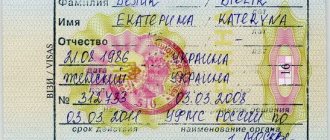Registration at the place of residence proves the fact that a person lives at a certain address and does not infringe on the property rights of other persons. If he does not have a registration, he risks facing penalties, the inability to find a job, receive medical care, or enroll his child in a kindergarten or school. Registration in an apartment with shared ownership has its own rules and features, which are discussed in more detail below.
Basic information
Every person living in the Russian Federation has the right to free movement, choice of address and residence in the country. At the same time, all citizens of the Russian Federation must register at their address of residence or stay. The internal affairs bodies control the registration process of citizens.
What does registration give? Here is just an incomplete list of emerging rights and opportunities:
- choosing a school institution based on your area of residence;
- receiving social benefits;
- receiving free medical care at the district clinic, inpatient treatment at the district hospital;
- the opportunity to register to enroll your child in kindergarten;
- confirmation of employment address.
Why is it needed?
Registration gives a person certain rights.
If available, it is possible:
- receiving benefits, pensions;
- registration of benefits;
- medical service;
- employment;
- visiting kindergartens and schools;
- protection of rights and interests in government institutions.
- opening a business.
- buying or selling real estate, car.
- registration of a driver's license.
In addition, without a valid registration, it is impossible to obtain a foreign passport for traveling abroad or exchange a Russian passport.
Procedure for registering a share of housing
The division of housing into several shares occurs in the following situations:
- privatization of housing;
- transfer of residential premises by inheritance;
- division of jointly acquired property upon dissolution of the couple’s marital union;
- donation of housing;
- Property For Sale.
If the apartment is in shared ownership, then it has several owners. In this case, the shares are real (allocated in kind - for example, a room in a communal apartment) or ideal, in the form of a fractional number.
Regardless of the size of the share, its owner has the right to sell it, donate it or rent it out. To do this, he will need to obtain permission to conduct the transaction from the remaining owners.
It is possible to register a person who is not a shareholder in an apartment with shared ownership, but in this situation it is also necessary to inform the others and obtain their written consent to registration.
As for minor children, domestic legislation allows their registration without obtaining the consent of other apartment owners.
In the case of a private house, each owner of a share allocated in kind can dispose of it as he wants. In case of common shared ownership, written consent from other homeowners will be required.
Attention! Houses that do not meet technical and sanitary standards, as well as dachas, are not residential real estate.
Reflection in the law
The registration rules are established by current legislation:
- Federal Law-5242-1 dated June 25, 1993 (as amended on April 3, 2017). Article 5 contains the grounds for registration and de-registration at the place of stay, Article 6 - at the place of residence.
- The regulations for recording and maintaining a database are set out in Decree of the Government of the Russian Federation - 713 of July 17, 1995.
- Federal Law No. 109 of July 18, 2006 establishes the procedure for migration registration of foreigners and stateless persons.
- Order No. 228 of September 11, 2012 contains the standards for the provision of public services for registration.
- The Administrative Code of the Russian Federation, in particular Article 19.15.1, contains conditions for liability for late notification of residence at a specific address.
- The Criminal Code, articles 322.2 and 322.3, establishes penalties for fictitious registration.
- Civil Code, paragraph 2 of Art. 244 reveals the concept of shared ownership.
Registration of registration in a housing share
To register for a share of housing, you will need to complete the following steps.
- Visit the passport office at the address where the apartment is located or go to the migration service department. Those present must include all shareholders and the person who plans to register. If any of the shareholders cannot come to the passport office on the appointed day, he will need to send a representative in his place using a power of attorney certified by an employee of the notary agency.
- Provide the necessary package of documentation and provide consent for registration in writing.
- On the specified date, visit the Ministry of Internal Affairs, where the department staff will put a registration stamp.
The registration procedure can be carried out at the MFC or on the government services website. After the uploaded documents are approved, you will need to affix a stamp indicating the changed residential address.
If registration needs to be done for a child under 14 years of age, then he does not have to be present during the procedure - his interests are represented by his parents or guardians. Children from 14 to 18 years old must be present along with the rest of the shareholders, signing the application along with other participants in the procedure.
When the parent of the registered child is the owner of the property, other shareholders do not have the right to interfere with the procedure. If the person being registered is the spouse of one of the owners, then the consent of the other owners is required (except for shares allocated in kind in communal apartments).
Sample application
Registration is of an application nature, so everyone applying for the service must fill out an application in Form No. 6. The document standard is uniform throughout the Russian Federation.
Where to go:
- department of migration service;
- Multifunctional Center;
- management company office;
- Passport Office;
- Internet portal of State Services.
The application form is filled out as follows:
- records are made by hand or in printed form using a computer;
- We indicate the details of the right establishing document for housing;
- apartment location address;
- fill in the applicant’s personal data fields;
- indicate the SNILS number.
Attention. You can fill out the application correctly with the help of a specialist from the migration service or using the prompts from the State Services system when filling out an application online.
Required Documentation
Applicants will need to prepare the following documentation package:
- Russian Federation passport (if registration is issued for a child under 14 years of age - a certificate of his birth);
- for the military - military ID, registration certificate;
- certificate of completion of imprisonment for those who were previously deprived of liberty;
- title documentation for a share in housing (but if the apartment is registered in Rosreestr, then the owners do not have to present anything);
- written consent for registration from the property owners;
- application for registration with registration of the share in which the owner does not plan to register.
The registration application must provide the following information:
- the name of the registration authority to which the applicant applies;
- information about the applicant;
- address of housing location;
- grounds for registration;
- consent of the remaining owners and their signatures.
The legislation does not provide for a strict template for writing owner consent, but you will need to provide the following information:
- owner's passport details;
- registration address;
- consent to register a new person;
- information about the registered person;
- date of writing the consent, signature of the owner.
If the document does not specify a statute of limitations, then this period is absent. But consent can be urgent if it was issued by an employee of a notary agency.
If the owner has a passport with him, then in the presence of a passport office employee, he can express his consent orally, without drawing up a document in writing.
There is no fee for carrying out the procedure for registering a person at his/her residential address. When registration is considered in court, you will need to pay a state fee of 300 rubles. If the court ruling is positive, the defendant will be required to pay all financial costs.
By place of stay
A Russian who has temporarily moved to another address for a period of more than 90 days is required to register.
Required when moving into:
- hostel for the duration of work on a rotational basis;
- hotel;
- Holiday House;
- housing in the private sector;
- tourist camp;
- recreation center
It is also issued for persons in prison.
Having a temporary registration preserves your permanent registration. Its validity period is limited to five years, after which re-registration is required. A foreigner must notify the Federal Migration Service within seven days from the moment of settling at a specific address.
The maximum period of stay in Russia for persons of foreign countries with a visa-free regime is three months. Re-entry is permitted only after 90 days. Citizens who have issued a visa can reside in the country until the end of its validity.
Accounting for the movement of citizens from other countries is necessary for:
- receiving help in crisis situations.
- implementation of rights and obligations.
- data accounting.
- studying migration flows.
- tourism development.
If the co-owners are against
The legislation allows registration without the consent of the other co-shareholders if the person being registered is a minor child of the share owner or the owner himself plans to register. Also, without consent, the procedure can be carried out with a share allocated in kind, which is a separate dwelling.
In other situations, if the owners disagree, there are 2 options for further action.
- Allocate property in kind. This method is optimal if the subject of the dispute is a premises that has separate living rooms. It is necessary to be able to carry out redevelopment so that exits and communications are non-intersecting.
- Sell or donate part of the share to a person who intends to register in it. In the case of a sale, one should take into account the fact that the shareholder has the right of first refusal, that is, he can agree to the offer to buy the property. When registering a deed of gift, the consent of the owners is not required. The disadvantage of this method is the following: the new owner of the share acquires the legal right to dispose of it as he pleases.
In the latter case, it is necessary to take into account the fact that if the donation was not made for relatives, then you will need to pay 13% personal income tax on the price of the transferred property. In a situation where the donation covered the purchase and sale transaction, the remaining co-shareholders have the right to initiate legal proceedings, as a result of which the transaction will be recognized as a sham and terminated.
Common shared ownership and features of the exercise of powers by its participants
1
.
A co-owner owns a share in the right
, but
not in the thing
. So, in the given example with the joint purchase of an apartment, each of its purchasers is the owner of a share in the right of common shared ownership of the entire apartment. But this does not prevent the latter from concluding an agreement on determining the procedure for using residential premises, stipulating who will live in which of the three rooms (Article 247 of the Civil Code), on the distribution of income from the use of common property (Article 248 of the Civil Code), for example, through renting it for rent, etc.
2
.
Possession and use
of property constituting the subject of common shared ownership is carried out by agreement of all co-owners, and in the event of a dispute, by the court at the request of any of them. Each of the shared co-owners has the right to claim ownership and use of a part of the common property commensurate with his share. If any of the co-owners owns and (or) uses a part of the common property that does not correspond to the size of his share, this discrepancy must be compensated. The procedure for using common property can also be determined by established custom (clause 2 of Resolution of the Plenum of the Armed Forces of the Russian Federation No. 25).
Maintenance costs
Participants in shared ownership also bear common property in proportion to the size of their shares (Article 249 of the Civil Code). Moreover, as a general rule, the obligation to bear the burden of maintaining common property does not depend on whether the co-owner uses it or not.
3
.
Disposal
of common property, as a rule, is carried out by agreement of all participants in shared ownership (clause 1 of Article 246 of the Civil Code); if such an agreement is not reached, the law does not allow determining the procedure for disposing of common property in court, since this would be too gross interference in the sphere of autonomy of will co-owners.
At the same time, the share
in the right of common ownership, each of its participants can dispose at its own discretion, taking into account the right of the remaining co-owners to the
preemptive acquisition
of the alienated share - in case of its
alienation for compensation
(clause 2 of Article 246 of the Civil Code)
outsider
.
Thus, the right of first refusal from co-owners arises when one of them sells his share in the right of common ownership, with the exception of cases of sale of a share at public auction (taking into account the rules of
Article 255
of the Civil Code) and the sale of a share in the right of common ownership of a land plot during a simultaneous sale parts of a building or structure located on such a site or premises therein.
To ensure the pre-emptive right to purchase, a co-owner who wishes to alienate his share to a third party is obliged to notify
other participants in shared ownership about their
intention to sell the share
, indicating
the price
and
other conditions of sale
.
The notification must be made in writing
and
received
by the addressee
(taking into account clause 1 of Article 165.1 of
the Civil Code).
If the remaining co-owners within a month - when selling real estate or within 10 days - when selling movable property from the moment of their notification, refuse
to purchase or
do not acquire
the share being sold (including by ignoring the message about the sale), then the seller will be able to sell his share
for the specified in communicating the terms and conditions
to a third party. Moreover, these terms are preemptive, which means the termination of the preemptive right upon their expiration.
If the seller violates this obligation, any of the participants in shared ownership has the right to, within a shortened period of limitation,
- three months - in court to demand
the transfer of rights and obligations under the transaction to him
, i.e. the latter is not recognized as invalid, only a change in the subject occurs on the buyer’s side (see clause 14 of the Resolution of the Plenum of the RF Armed Forces, Supreme Arbitration Court of the Russian Federation No. 10/22, clause 1.2 of the Resolution of the Plenum of the RF Armed Forces No. 4).
By virtue of clause 5 of Art. 250 of the Civil Code, the above rules also apply to the exchange
(but if the share is exchanged for some unique thing, for example, a residential building or an original painting by a famous artist, the remaining co-owners are unlikely to be able to exercise their right of advantage; this, however, does not mean that they do not need to be notified of the upcoming exchange).
The exercise of the right of pre-emptive acquisition when making a share in the right of common ownership as a contribution to the authorized (share) capital of a business company or partnership is excluded (see Determination of the Supreme Court of the Russian Federation of March 11, 2014 N 56-KG13-12) in the event of its alienation in within the framework of relations of lifelong maintenance with dependents (clause 1.2 of the Resolution of the Plenum of the Armed Forces of the Russian Federation No. 4).
4
.
As follows from paragraph 1 of Art. 24 of the Law on Registration of Rights to Real Estate, a transaction for the sale of a share in the right of common ownership of real estate
a third party must be concluded in
notarial form
.
of land shares
require notarization (clause 3 of Article 24.1 of the Law on Registration of Rights to Real Estate).
In contrast to the general rule of paragraph 1 of Art. 223 of the Civil Code, the share in the property right is transferred to its acquirer under the contract from the moment of its conclusion. If the agreement itself or the transfer of the right in which the share is acquired requires state registration, the moment of transfer of the corresponding share is associated with the moment of such registration (Article 251, paragraph 2 of Article 223, Article 8.1, 131 of the Civil Code).
5
.
The division
of property that is the subject of common shared ownership is carried out by agreement of its participants and entails the termination of common ownership.
If only one of the subjects of common property wishes to withdraw from its participants, he has the right to demand the allocation
of his share in the relevant property (after the allocation between the remaining participants in the common property, the relations of shared ownership are preserved). By agreement of the participants in the common shared ownership, the allocated co-owner, instead of allocating a natural share by other co-owners, may be paid compensation for its value.
If no agreement is reached
between co-owners, the division of common property, as well as the allocation of a natural share from it, is carried out
in court
.
It should be noted that the allocation of a share from the common property or its division is not always possible. So, for example, in relation to a residential building, they are permissible only if it is possible to isolate its isolated part with a separate entrance or convert the corresponding part of the house into an isolated one. If, in this case, the shares in the property formed as a result of the division do not correspond to the size of the shares in the right of common shared ownership, the corresponding difference is compensated (see paragraph 11 of the Resolution of the Plenum of the USSR Supreme Court No. 4).
Under certain circumstances, the law, in principle, does not recognize the right of shared co-owners to allocate their share in the common property in kind, allowing only the possibility of appropriate compensation. This right to compensation arises in the following cases:
1) the law does not allow the allocation of a share in kind (paragraph 2, paragraph 3, article 252 of the Civil Code);
2) the allocation of a share in kind is impossible without disproportionate damage to the common property (paragraph 2, paragraph 3, article 252 of the Civil Code), for example, if it entails the impossibility or inconvenience of using the property for its intended purpose, a significant reduction in the material or artistic value of the latter (see paragraph 35 Resolution of the Plenum of the RF Armed Forces, Supreme Arbitration Court of the Russian Federation N 6/8, paragraph 7 of the Resolution of the Plenum of the RF Armed Forces No. 4);
3) by a court decision on the payment of such compensation, regardless of the consent of the co-owner who filed a claim for the allocation of his share in kind
, if the latter
is insignificant, it cannot be actually allocated
, and the interest of the allocated co-owner in the use of common property
is insignificant
(clause 4 of Article 252 of the Civil Code, Determination of the Constitutional Court of the Russian Federation of February 7, 2008 N 242-О-О).
How to evict an unpleasant neighbor
Sometimes the neighborhood brings a lot of problems to other sharecroppers. The question arises about the forced eviction of such a neighbor, especially if his residence nearby poses a threat to minors.
There are two legal ways to evict a neighbor - challenge his right of ownership of the share by going to court, or offer the person to buy out his share at market value. After the sale and purchase, the neighbor will immediately need to vacate the premises.
If an interested party goes to court to evict a person, the plaintiff will need to prove the illegal acquisition of the right to a share in the housing. For example, the defendant deceived the previous owner or, under the influence of threats, forced him to sell his share. It is necessary to contact a professional lawyer, since it is difficult to prove anything in such cases.
In a situation where the court makes a positive decision on the plaintiff’s application, the neighbor is deprived of his rights to living space.
✅ Judicial practice
The judgment about the possibility of unhindered registration without the consent of other owners is erroneous. If desired, the co-shareholder can challenge the legality of the actions of the registration authority.
Example: The Shatura City Court of the Moscow Region considered a claim to declare registration at the place of residence illegal.
Citizen K. is the owner of ¾ shares in the apartment. She was mistaken that her nephew was the owner of the remaining ¼ share, but after contacting the utility service to clarify the debt on the apartment, she found out that there were more owners than she had expected, and they were registered without her knowledge.
K. stated the following facts:
- After the death of her mother, she became the heir to ½ of the disputed property, the remaining ½ was owned by her brother.
- After his brother's death, his property was divided between his wife and son (K's nephew) ¼ each.
- K. bought ¼ of the share from her daughter-in-law and became the owner of ¾ of the apartment.
- Without K.’s knowledge, the nephew donated 1/8 shares of the apartment to third parties.
- The new owners registered in the property, and also, without K.’s knowledge, registered their 2 minor children.
K. opposed the registration of new owners and their children in the property.
As a result, the court decided to satisfy the claim and recognize the registration of co-shareholders and their children as illegal. The main argument was the provisions of paragraph 1 of Art. 247 of the Civil Code of the Russian Federation: the use of property in shared ownership is possible only by agreement of the parties.
Despite the fact that the defendants became the owners under the gift agreement, they did not obtain the consent of the co-owner to move in, and if agreements are not reached, the procedure for use is determined by the court. The procedure for use previously established with the previous owner is invalid. Since the new owners did not provide the UVM department with a document confirming the co-owner’s consent to the registration of third parties or a document on the established procedure for use, the registration is considered illegal.
Despite the presence of a document on ownership, the rule for co-sharers is to respect the interests of the other owners of the house or apartment, otherwise grueling litigation and damage to relations with co-owners cannot be ruled out.
Do you need to register a person in an apartment with shared ownership? Do not take hasty actions, because if the law is not observed, even the actions of the registration authority are contestable. But you shouldn’t delay registration either - this is fraught with an administrative fine. We recommend asking your lawyers whether consent is required for registration when registering a relative, child, or acquaintance in a share of an apartment? You probably want to hear the answer to the question of how to register if the co-owner disagrees? Answers to all questions are provided free of charge - on-duty lawyers will review your request 24/7 at any time of the day or night. Contact us! Attention!
- Due to frequent changes in legislation, information sometimes becomes outdated faster than we can update it on the website.
- All cases are very individual and depend on many factors. Basic information does not guarantee a solution to your specific problems.
That's why FREE expert consultants work for you around the clock!
- via the form (below), or via online chat
- Call the hotline:
- 8(800)302-39-65
— All residents of the Russian Federation - +7(495)128-69-80
— Moscow and the Region - +7(812)509-13-65
— St. Petersburg and region
- FREE for a lawyer!
By submitting data you agree to the Consent to PD Processing, PD Processing Policy and User Agreement.
Anonymously
Information about you will not be disclosed
Fast
Fill out the form and a lawyer will contact you within 5 minutes
Tell your friends
Rate ( 4 ratings, average: 5.00 out of 5)
Author of the article
Maxim Privalov
Lawyer. 2 years of experience. I specialize in civil disputes in the field of housing and family law.
Author's rating
Articles written
614
Let's sum it up
Domestic legislation allows registration in an apartment and with shared ownership. In general cases, this requires the consent of the remaining shareholders, drawn up in writing. If a child of one of the owners is registered, then no consent is required.
To register a person in an apartment, you will need to visit the passport office at the address where the housing is located, providing the employees with all the necessary documentation.
If the shareholders do not agree to register a new person in the apartment, then the owner has 2 options - to allocate the property in kind if the appropriate technical capabilities are available, or to sell/donate the share to the person who planned to register in it. The last option is riskier.
Registration at place of residence
Having housing under a social tenancy agreement or a document confirming ownership of real estate will allow you to receive a mark in your passport in the form of a stamp.
Permanent registration has no statute of limitations. By registering at a specific address at the time of birth, you can live in an apartment or house for the rest of your life.
A change of permanent residence obliges a person to provide information to the migration service within seven days from the date of settlement.








